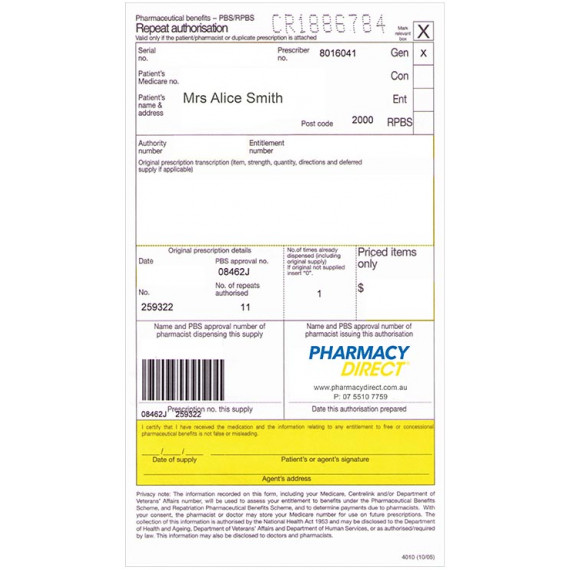
This would allow doctors to send their patients and electronically generated barcode, which the patients can send to a pharmacy to get scripts filled without leaving home.
Although the legislation for paper scripts has changed to allow electronic scripts to be used via a patient’s mobile phone, none of the patient management systems has done the development to allow their systems to use a new patient electronic token system and exchange being run by Medisecure and eRX.
Some of the major patient management system vendors have been asked to expedite their development amid the COVID-19 crisis, but development times and costs are impractical given the timelines to get a system up and running which would cater for home-bound patients.
The alternative interim system being proposed by the GP groups is simple:
- During a Telehealth consult, a GP prints a prescription as normal. The barcode on the script (or a copy of the whole script) is sent to a patient via whatever means (email,SMS, or image capture during video consultation).
- The barcode is automatically sent via the script exchanges to all pharmacies already using the current system.
- The patient just then needs to identify themselves and send the barcode to their nearest pharmacy which can deliver.
In order for the proposal to be approved, all states and the federal government will need to come to agreement. This has now been facilitated by Canberra’s ‘war cabinet’ footing where all state health ministers and the federal minister meet each day via the Australian Health Protection Principal Committee (AHPPC).
Dr Rob Hosking, Chair of the RACGP Expert Committee on Practice Technology and Management, told The Medical Republic, that the College would be coming out with a position statement tomorrow outlining the principals of the workaround, and would be ready to talk to the AHPPC formally early next week.
Dr Hosking said that the workaround required the states to suspend current requirements that make original paper prescriptions the only legal means of obtaining a script outside of the new electronic token system being developed by the Australian Digital Health Agency (ADHA), the script exchanges and FRED IT.
Although apparently some in government and some pharmacy groups have suggested the development of this new system be expedited, with a timeframe of only eight weeks until launch, the major PMS vendors have said it’s an impossible timeframe for them given that they have yet to even start on the software development for their systems, and they are already inundated with existing system requests around COVID-19 information and system updates for existing systems, such as bookings.
“This temporary system can literally be up and running in a few days, if the various governments are prepared to approve the workaround,” Dr Hosking said.
The major issue for state governments is likely to be overriding existing legislation, at least in the short term.
Dr Hosking pointed out that the entire infrastructure is there to stop the issue of patients who are isolated not being able to get scripts at home now. “We are just stuck with old legislation at the moment that the government should probably suspend, if only while we are amid the crisis,” he said.
Dr Hosking said it was unfortunate that the new system being developed was not online now, but it was entirely impractical to expect PMS vendors to drop everything and try to get it working within eight weeks, and it was potentially dangerous to try to do it that quickly.

